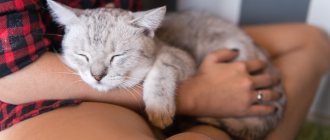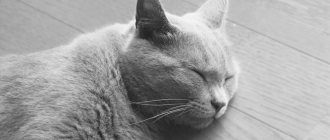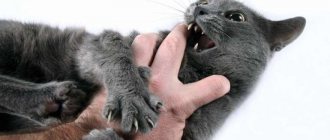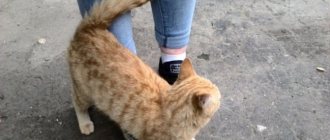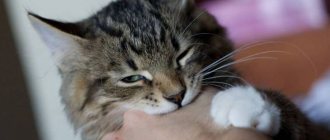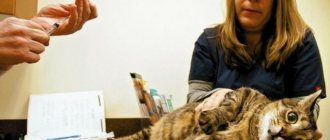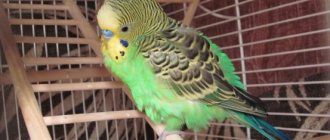Concern for the well-being of a small pet makes people wonder why the kitten constantly sleeps. Having a poor understanding of the characteristics of the animal’s body, it is worth understanding the question of what to do if the kitten is constantly sleeping, and how you can help in this incomprehensible situation.
Normal sleep duration for a kitten
Wild cats are predators that prefer to hunt prey at night. During the day they get enough sleep to regain strength. The sleep is sensitive, intermittent, the animal wakes up from the slightest rustle. Always on the alert. Pets do not have to get their own food; they live in favorable conditions, where they are fed to their fill, houses are built, and sleeping places are provided. They don’t need to hunt at night and be on “combat readiness” during the day, so they can afford to sleep longer – up to 18 hours a day. However, the life cycle features of wild and domesticated cats are similar. As for small cubs, their sleep duration is much longer than that of adult animals.
Why does a cat need its place in the house?
Cats are freedom-loving and unpredictable animals. Sometimes they like to lie in the arms of their owner or look around the room, climbing to the highest point in the room. Sometimes it’s not easy to find them: they crawl into a closet, a new box and sleep quietly. To ensure that the animal does not look for a place where it can retire, its own house or soft bed is designed. Here the pet can relax and sleep sweetly. If he is unwell, the owner will easily notice this, because the animal will not hide in the corners, but will come to his “closet”.
When long sleep is a sign of illness
A kitten's long sleep should not cause concern to the owner. But you should be wary if, in addition to the constant need for rest, the kitten shows other signs of illness. For example, he refuses food and water, often visits the litter box, the coat becomes dull and brittle, and the temperature is elevated.
It is very difficult for the owner to determine why the kitten is feeling unwell based on these symptoms, so you need to contact a veterinarian. He will prescribe the appropriate treatment, after which the kitten’s sleep problems will disappear.
Increased drowsiness can be a symptom of diseases such as inflammation of internal organs, helminthiasis, viral infection, and the development of a cancerous tumor.
Prevention and timely diagnosis of diseases will increase the pet’s quality of life.
Excessive sleepiness may be a cause of illness
Alarming symptoms
An apathetic drowsy state is one of the signs of a developing pathological process, but it is always accompanied by additional signs:
- Due to partial or complete lack of appetite, the pet refuses even its favorite dishes and treats.
- The surface of the nose becomes dry and hot, and mucous may be discharged.
- Apathetic state - the cat does not respond to light, sounds, or touches.
- Refusal of water or excessive thirst.
- An increase in body temperature above 40 degrees, which can be seen by the hot tips of the ears.
- Diarrhea or vomiting.
- Pallor of the mucous membranes, deterioration of the coat.
If it is noticed that the kitten is not only constantly sleeping, but is also suffering from one or more alarming symptoms, then it should be immediately shown to a veterinarian. A full professional examination, as well as tests, will help to quickly determine the cause of the atypical behavior and cure the cat.
Sleep disturbance
Typically, kittens sleep calmly and evenly, so excessive sleepiness or chronic lack of sleep is evidence that the pet is stressed or ill.
Kittens take about 50 breaths per minute. If this indicator is higher in a dream, then it is worth observing to understand the cause of the problem. Perhaps the kitten is emotionally disturbed by what is happening in his dream and the owner has nothing to worry about.
Fear and mistrust of the owner leads to the fact that the kitten sleeps very little. He is simply afraid to fall asleep while someone is awake in the house. This requires taking action, because lack of sleep has a very bad effect on a growing kitten.
A kitten's trembling in its sleep can be caused by several reasons - previously experienced stress, uncomfortable posture, the onset of inflammatory processes and diseases. The owner needs to monitor the pet and contact a veterinarian in time.
To determine the kitten's health status, you can watch its sleep.
Removing interference and getting ready for healthy sleep
Tight clothes and a blanket that is too warm bring discomfort to a baby at any age. Also, children at 5 months are already quite emotional. Don't play too active games before bed. Don't plan to have guests in the evening or do it after you put your child to bed at night.
On the contrary, give your baby a massage and bathe him in herbs that promote sound sleep. You can pour a decoction of mint, lemon balm, lavender, chamomile, and thyme into the bath. Naturally, a mother’s lullaby, a fairy tale told in a calm, quiet monotonous voice, has a great effect on sleep. These tips don't just apply to babies as young as five months old. You can come up with your own rituals for sound sleep for your baby from birth. He will get used to it and will fall asleep faster.
If your baby has restless sleep, it is first of all important to find out the causes of the problem, and only then look for ways to deal with it.
Causes of drowsiness in kittens
In addition to natural physiological reasons, the duration of a cat’s sleep is influenced by external factors:
- Lifestyle;
- nutrition;
- weather;
- presence of irritants.
Kittens sleep longer if they are fed and have played a lot. Prolonged sleep is needed to fully recuperate. A short period of wakefulness on hot, sultry days, before rain, when atmospheric pressure decreases, the level of nitrogen in the air increases. Hormonal levels influence sleepiness. Females sleep longer. In addition, the activity of pets directly depends on the breed. If the kitten sleeps a lot, but during the waking period shows normal activity and looks completely healthy, there is no reason to panic. When the baby grows up, gains strength, changes his lifestyle, the regime will change.
External factors
A cat's sleep is influenced by environmental factors: weather, food and air temperature in the house. On cloudy days, cats tend to sleep longer.
A pet's drowsiness can also be caused by rich and high-calorie food. To digest such food, it is better for the cat to be at rest. Therefore, after a hearty lunch, the pet almost immediately goes to bed.
The higher the air temperature in the room, the more sleepy the animal will be. Therefore, many cats like to sleep near heating radiators. Warmth provides them with deeper and more sound sleep.
What else affects sleep duration?
In addition to age, other internal factors, as well as some external ones, influence individual sleep duration. Because of this, pets of the same age require completely different amounts of time to rest.
Satiety
If a cat sleeps peacefully all day, then he does not feel hungry. He uses all this time to digest food. Animals that eat high-protein foods rest especially long.
Physical activity
The energy spent during outdoor games is restored during sleep. But this does not mean that the main couch potatoes are energetic and playful pets. In their case, the time of falling asleep coincides with the end of the game. Having recharged, they are ready for new adventures.
External (including weather) conditions
The calmer, more comfortable and quiet the environment in the room, the easier it is for the animal to fall asleep. Pets sleep the longest when their owners are away. If you install hidden cameras, you can see that the mustachioed pets get up just to drink water.
Sleep duration increases during rainy weather and hot summers. If your pet rests for a long time during the heating season, then dry air is to blame.
Some animals are sensitive to weather conditions. If it’s gray and rainy outside, the pet will sleep almost all the time, except for feeding and going to the toilet.
Breed
The character traits of different breeds are no less important. Persians, Ragdolls, Devon Rexes, Britons and Scots sleep the longest. They are quite lazy and often fall asleep immediately after eating.
More active breeds include Abyssinians, Siberians, Bengals, Siamese, Kurilian Bobtails and Egyptian Mau. Representatives of these breeds love active games with their owner and hunting, so with enough attention they are constantly on the move.
Health status
Representatives of the cat family are good at capturing other people's emotions. A quarrel between beloved owners can cause them great anxiety and worry. When under constant stress during a move or other exciting event, they will hide in secluded places and sleep longer than usual. Also, the reason may lie in the disease.
Do I need to wake up how to do it correctly?
If a toddler misses one feeding, it’s not a big deal. But it’s better to wake him up for the next one.
Mom herself must choose the appropriate way to wake up her sleepyhead
First of all, it is necessary to understand that waking up a child is possible only in the REM sleep phase. It is not difficult to identify it: his eyelids begin to twitch, his pupils move under them, his limbs move, and grimaces appear on his face. The following actions could be:
- apply the crumb to the chest (the smell of milk will wake him up), if there is no reaction, then drip milk onto the lips;
- lift the blanket, carefully undress the baby (only if the room is warm!);
- change the diaper (if necessary);
- Gently massage the back and legs;
- wipe your face with a soft, warm, damp cloth;
- lift the baby to an upright position;
- if the baby is more than 6 months old, you can put him in prison;
- We start talking quietly with Sonya, singing songs to him.
Please note that the light in the room at the moment of awakening should be dimmed, so that when the little one opens his eyes, he does not instinctively close them from sudden irritation.
Doctor Komarovsky's opinion: to wake up or not to wake up?
Dr. Komarovsky claims that with normal development, the baby himself is able to determine how much sleep he needs. And the forced interruption of sleep, just because the parents are convinced that the time has come for the little one to eat or do other things, is nothing more than an act against nature
At the same time, the doctor focuses on the fact that the baby sleeps for a long time, but at the same time he has no health problems. Otherwise, the mother should not come up with a way to wake up the baby, but consult a doctor for advice
Normal sleep duration for an animal
Like human offspring, kittens sleep almost all the time, interrupting only to feed. This is completely normal, because their body is still very weak. In their sleep they grow and become stronger. A slightly older cub sleeps less, but still at least half a day.
An adult cat sleeps about the same amount or a little less/more. It is impossible to give an exact figure, because all animals have a pronounced individuality. Much depends on the character. Some cats are energetic, active, they play a lot and have fun. Others are inert, lethargic, prone to weight gain and much less active than their vigorous counterparts. Most of the time they just sleep.
There is a popular expression: “sleeps like a cat with half an eye.” This is a very apt remark. Unlike humans, who must sleep at least 7-8 hours in a row to restore energy, cats sleep in “short intervals.” On average, they simply doze for most of the time without losing their alertness. As soon as the slightest rustle is heard, the cats immediately wake up.
All sleep in cats is divided into two phases:
- Nap, superficial “slow” sleep – 20-30 minutes.
- Deep, “fast” sleep – 5-7 minutes. At this time, animals, like people, dream. Cat owners are well aware of this, since a sleeping pet can twitch its paws in its sleep, “run” and even meow. All this clearly indicates the presence of dreams.
The duration of sleep can be influenced by various external factors, for example, extreme fatigue, stress, changes in temperature. Physiology also influences the duration of rest. Pregnant cats sleep much more - this is a need for the body experiencing increased stress.
How long should a kitten sleep?
In the first month of life, small, still blind kittens sleep about 23 hours a day. In the second month, the waking time increases to 6 hours, and by six months the animals adapt to the adult regime, and they spend about 16 hours sleeping. They sleep mainly during the day, because cats prefer to play at night. This is the norm for healthy cats in good health.
At 3 months, the normal amount of sleep for a kitten is 18 hours.
Impact of maternal health
Does the condition of the expectant mother somehow affect the birth of a baby with floppy baby syndrome? During the research, experts noted the following:
- Some of the young patients' mothers suffered from neuromuscular pathologies. In particular, myotonic muscular dystrophy. The disease limits the natural movement of the fetus in the womb.
- Some mothers were diagnosed with ulcerative colitis. This disease also limits the movement of the embryo.
- Taking alcoholic beverages, narcotic substances, and anticonvulsants during pregnancy also in a number of cases caused the birth of a child with diffuse hypotension.
After sterilization
It should be noted that after sterilization surgery, the cat does not eat and sleeps all the time; this is a normal state after anesthesia. If this period lasts for 24 hours, then there is nothing to worry about. If a day has passed and the condition does not change, you need to urgently see a veterinarian.
During the first 24 hours, you don’t need to force the cat to get up or wake him up if she doesn’t want to. Just like insisting on food and drink. Give her a little rest, recover, and she will again delight you with her cheerful appearance.
If the anesthesia has not worn off and the cat is not sleeping, gets up and tries to move around the apartment, do not let it out of sight so that it does not accidentally get injured. It’s better to take her in your arms, calm her down, and maybe she’ll fall asleep. Sleep is the best medicine here.
Colic
Even more often, restless sleep in infants is observed due to colic. The child experiences cramping pain in the tummy. As a rule, they begin to torment infants at 2 weeks and stop at three months. Some people may experience pain for up to a year.
How to determine that a child has restless sleep due to colic? If a baby has problems with the tummy, then he cries a lot and tightens his legs. The child also has symptoms of flatulence. The baby has a swollen and dense tummy, in which gases have accumulated.
When a baby has colic, he most often refuses to eat. He takes the breast just to calm down, and uses it as a pacifier, but does not want to eat. As a rule, during this period the child either does not gain weight or its growth stops. Even if the baby falls asleep, he whines in his sleep. From the gastrointestinal tract, problems such as regurgitation, vomiting, and green stools appear.
Sleep phases
The sleep of mustachioed pets consists of two constantly alternating phases: slow and fast. During the first phase, the animal dozes. Despite the slowdown in heart rate, breathing and metabolic processes, his muscles remain tense and his brain remains active. This maintains the sensitive response to external stimuli necessary for survival.
A curled up cat quickly and easily wakes up if disturbed by its owner or a loud sound. The slow phase lasts no more than 30 minutes.
In the absence of stimuli, the first phase flows into the second. At this stage, the body is completely relaxed, so you can see twitching of the paws, eyelids and whiskers. The duration of the fast phase is no more than 7 minutes.
For homeless animals it is shorter, since it is very difficult to wake up at this time. Losing control over what is happening can result in death. Pets do not have this problem - the safer he feels, the longer his fast phase.
To help pet owners - a convenient and free Petstory service
Online consultations with the best veterinarians, making an appointment, quickly searching for the nearest veterinary clinic or pet store, a lot of useful information about the breeds of pets, about the proper upbringing, care, maintenance, treatment of pets - all this will be at your fingertips with Petstory.
Download the specialized application for pet owners Petstory on the IOS and Android platforms using the link – https://petstory.ru/prilozhenie-konsultacija-veterinar/.
Author: Pavel Chaika, editor-in-chief of Poznavaika magazine
When writing the article, I tried to make it as interesting, useful and high-quality as possible. I would be grateful for any feedback and constructive criticism in the form of comments on the article. You can also write your wish/question/suggestion to my email [email protected] or Facebook, with respect, the author.
Author page
Changes in sleep depending on age
Experienced felinologists know that the duration of a cat's sleep varies depending on the age of the individual. The approximate duration of rest is as follows:
- Kittens up to three weeks sleep 22-23 hours, and wake up only to eat.
- Month-old babies have been resting for 20-21 hours, and spend the rest of the time exploring the world and playing their first games.
- Kittens from two months sleep for 18-20 hours.
- Adults are in the arms of Morpheus for 14 to 16 hours, which is considered the norm.
- Old animals sleep on average 22 hours, and wake up only to eat, go to the toilet and take a short walk or be close to the owner.
Sleep is an important component of a cat’s life, without which it will not be able to please its owners, frolic, run and hunt. A full, long rest, not accompanied by a lack of appetite and lethargy, is the key to health and longevity.
